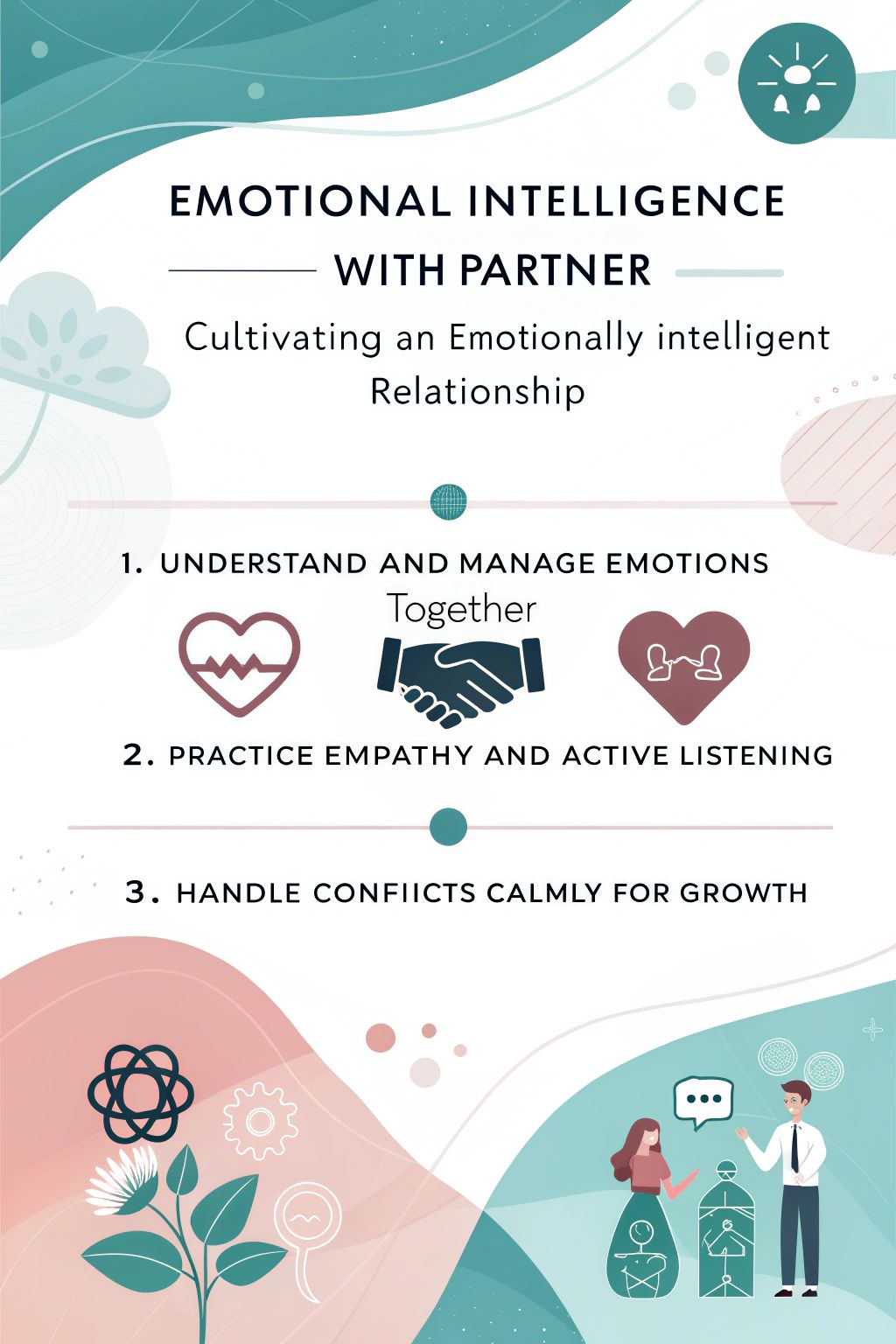Many people struggle to build strong, healthy relationships. They often find it hard to understand what their partner feels or how to react in tough times. This is where emotional intelligence with a partner comes into play.
It’s about knowing and managing your emotions and understanding your partner’s feelings too.
Emotional intelligence (EQ) plays a key role in making romantic relationships work well. It allows couples to connect on a deeper level and tackle problems together effectively. Our article will guide you through increasing EQ in your relationship for better understanding and stronger bonds.
You’ll learn how to spot signs of high or low EQ in your partner, improve communication, and support each other during stressful times. Unlock the secret to a lasting connection.

Understanding Emotional Intelligence in Relationships

Understanding Emotional Intelligence in Relationships is vital for fostering a healthy and fulfilling connection. This involves defining emotional intelligence (EQ) and highlighting its significance in maintaining strong romantic relationships, thereby allowing partners to navigate emotions effectively.
Defining Emotional Intelligence (EQ)
Emotional Intelligence (EQ) pertains to the comprehension and regulation of one’s own emotions, as well as the capacity to recognise and sway the emotions of others. This skill is vital for cultivating wholesome, satisfying romantic relations.
EQ involves a keen awareness of emotional shifts, welcoming diverse emotions devoid of judgement, and evaluating relationship dynamics proactively.
Primary components of EQ embrace recognition of self, awareness of social dynamics, sensitivity towards the emotional states of others, effective problem-solving amidst stress, and fostering a positive perspective.
Literary works such as “The Seven Principles for Making Marriage Work” penned by John Gottman provide insights on augmenting these abilities in personal connections. Support such as couples therapy and digital workshops propose tangible exercises to fortify emotional ties between partners by refining their way of communication and shared comprehension.
Importance of EQ in Romantic Relationships
In romantic relationships, having a high level of emotional intelligence (EQ) matters a lot. Partners with high EQ create a strong bond because they handle conflicts better and understand each other’s feelings deeply.
They don’t let arguments turn into lasting issues. Instead, they see problems as chances to grow closer. Fear of change can make relationships stale, but those who welcome change find new ways to love each other.
Good EQ stops blame and shame from hurting the relationship. It keeps negative emotions from getting stuck between partners. Couples on the same wavelength with their EQ enjoy more happiness together.
They ask questions like “Does being with my partner make me feel energised?” or “Do we share kindness and understanding widely?” This shows how much emotional smarts affect both people feeling good in their love life.
Recognising Emotional Intelligence in Your Partner
Recognising emotional intelligence in your partner involves observing their ability to understand and manage their own emotions, as well as empathise and respond to yours. Signs of high emotional intelligence include effective communication, self-awareness, empathy, and the capacity to navigate conflicts in a calm and constructive manner.
On the other hand, indicators of low emotional intelligence may manifest as difficulty expressing emotions, lack of empathy or understanding towards others’ feelings, and tendencies towards escalating conflicts rather than resolving them peacefully.
Signs of High Emotional Intelligence
People with high emotional intelligence often show it in clear ways. They understand their own feelings and can handle them well. This ability is known as self-awareness. These individuals also express a healthy curiosity about others’ thoughts and emotions, showing they care and are engaged in the world around them.
Having good boundaries means they know where their feelings end and another’s begin, preventing emotional overload or dependency.
Another sign of high EQ is someone’s ability to maintain strong relationships outside of romance, like friendships or familial bonds. They don’t solely depend on their partner for all emotional support but rather draw from a wider network.
This lessens the strain on any single relationship and enhances overall resilience. Gary Chapman’s concept of love languages also plays into this by fostering understanding through words of affirmation, acts of service, receiving gifts, quality time, and physical touch—all reflecting different aspects of emotional intelligence in engaging with others meaningfully.
Red Flags: Indicators of Low Emotional Intelligence
Certain behaviours may hint that your romantic partner has low emotional intelligence. If they often lack empathy or dismiss your feelings, it’s a red flag. This shows they struggle to understand and share your emotions.
Disrespectful actions or contempt also signal low EQ. These individuals find it hard to control their emotions effectively.
They might also be bad at communicating or show little interest in personal growth. Modern dating actions like ghosting reflect an avoidance of intimacy and point towards lower emotional understanding.
Yet, a willingness to grow can change the dynamics for a partner with low EQ. Keep an eye out for these signs as they impact relationships deeply, affecting both mental well-being and relationship satisfaction.
Building Emotional Intelligence in Your Relationship
Developing emotional intelligence in your relationship demands self-evaluation and mutual comprehension. Engaging in active listening and showing empathy play a vital role in this process, enabling both partners to handle conflicts through emotional awareness and enhance their bond.
Self-Assessment and Mutual Understanding
Self-assessment and mutual understanding lay the groundwork for building emotional intelligence in relationships. Couples must first engage in fostering self-awareness to recognise their own emotions and how they impact the relationship.
This process involves asking critical questions such as whether their partner needs something new from them or if external factors call for changes in roles. They should also assess if both partners remain as content as they previously were, using this insight to guide conversations towards improving mental well-being and relationship satisfaction.
Tools like emotional intelligence assessments can help track progress and pinpoint areas needing growth. For example, resources such as couples therapy and books like “The Seven Principles for Making Marriage Work” by John Gottman provide techniques to enhance communication skills and create an environment supportive of emotional expression.
Practising these strategies enables partners to address mental health challenges together, leading to a deeper connection and fulfilling long-lasting relationships grounded in understanding each other’s thoughts and feelings thoroughly.
Active Listening and Empathetic Engagement
Active listening and empathy play a key role in forming a deep connection with your partner. They involve giving full attention to your partner, understanding their viewpoints without judgement, and responding in supportive ways.
This method strengthens the bond between couples by ensuring both partners feel heard and valued. Journaling together or separately about these conversations can also help reflect on emotions and understand each other better.
Exercises like role-playing conflict situations improve how you communicate during disagreements, making it easier to find resolutions that work for both of you. Practising gratitude together encourages focusing on positive aspects of the relationship, fostering an environment where emotional intelligence flourishes.
These activities not only boost EQ but also make tackling stress and challenges as a team more manageable.
Managing Conflicts Through Emotional Awareness
Managing conflicts through emotional awareness means partners learn to handle disagreements without blame or shame. This approach turns challenges into chances for growth. Couples should ask themselves if their relationship boosts overall energy, mental clarity, and creativity.
They must also see if love leads to more empathy and generosity towards each other.
Using journaling lets partners reflect on their feelings privately. Gratitude practices help them appreciate positive aspects of the relationship. Mindfulness exercises focus attention on the present moment, helping to calm tensions during a dispute.
Active listening validates a partner’s feelings, showing understanding and compassion. Role-playing conflict resolution increases empathy and improves communication skills, aiding in resolving arguments effectively.
Implementing EQ Strategies for a Stronger Bond
Establishing EQ strategies can notably improve your bond with your partner. Practising active listening and showing empathetic engagement can help forge a deeper emotional connection and promote mutual understanding within the relationship. Communication techniques that enable genuine dialogue and practical exercises designed to enhance EQ can equally be pivotal in fortifying the bond between partners.
Communication Techniques That Foster Connection
Additionally, nurturing a strong and healthy relationship requires fostering connection through effective communication techniques. Active listening, free from interruptions or judgement, creates an environment where partners feel heard and understood.
Using “I” statements to express personal feelings and needs encourages open dialogue without assigning blame. Moreover, non-verbal communication can signal understanding and empathy, enhancing emotional connection.
Validating a partner’s emotions and experiences while responding empathetically reflects genuine care and consideration.
Practical exercises such as journaling to reflect on emotions, gratitude practices to appreciate positive aspects of the relationship, mindfulness exercises focusing on the present moment, active listening exercises to validate and empathise with a partner, as well as role-playing conflict resolution, all play significant roles in boosting emotional intelligence within relationships while fostering deep connections between partners.
Practical Exercises for Couples to Boost EQ
Couples can improve their emotional intelligence (EQ) through practical exercises, nurturing self-awareness and empathy. Writing in a journal allows partners to contemplate emotions, encouraging understanding and self-reflection.
Moreover, practising gratitude helps in valuing positive aspects of the relationship, strengthening optimism and emotional connection. Mindfulness exercises prompt couples to concentrate on the present moment, fostering a deeper connection and awareness within the relationship.
As well as, active listening exercises enable partners to validate each other’s feelings and empathise with one another effectively. Role-playing exercises provide opportunities for practising conflict resolution and empathetic communication skills in a safe space.
Implementing these practical techniques enhances emotional well-being within relationships and fosters strong communication skills vital for building an emotionally intelligent partnership.
Overcoming Challenges with Emotional Intelligence
Emotional intelligence plays a vital role in overcoming challenges within relationships. By harnessing emotional awareness and empathy, partners can navigate conflicts effectively and foster healthy communication.
Recognising the signs of high emotional intelligence in your partner can facilitate understanding and create opportunities for growth within the relationship.
Implementing strategies such as active listening, empathetic engagement, and managing conflicts through emotional awareness can strengthen the bond between partners. Moreover, viewing challenges as opportunities to cultivate creativity in problem-solving rather than resorting to blame or unresolved negative patterns is instrumental in developing an emotionally intelligent relationship.
Additionally, addressing past emotional baggage from prior relationships while accepting mistakes for personal growth enhances the overall well-being of the partnership.
Supporting Each Other in Stressful Times
In times of stress, it’s vital for partners to provide mutual support and understanding. Encouraging open communication and actively listening to each other’s concerns can help build emotional resilience in the relationship, fostering a stronger bond that withstands challenging moments.
This aspect forms a pivotal part of cultivating an emotionally intelligent relationship. To explore further into this essential component, read more on our blog.
Navigating Disagreements and Misunderstandings
Negotiating disagreements and misunderstandings is crucial for maintaining a healthy and harmonious relationship. High emotional intelligence (EQ) plays a vital role in effectively managing conflicts between partners.
Active listening, empathetic engagement, and emotional awareness are fundamental tools for handling disagreements with understanding and respect. Implementing EQ strategies, such as communication techniques that foster connection and practical exercises to boost EQ, can strengthen the bond between partners, ultimately leading to more fulfilling relationships.
Identifying signs of low emotional intelligence in a partner is also significant when addressing disagreements. Understanding social awareness and the ability to monitor one’s own and others’ feelings can help couples navigate conflicting emotions more effectively.
Furthermore, being mindful of red flags indicating low EQ in a partner allows individuals to provide support without enabling unhealthy patterns or behaviours. By harnessing the power of high emotional intelligence skills within the relationship dynamics, couples can improve their ability to communicate and address challenges constructively.
Building Emotional Resilience Together
Fostering emotional resilience together strengthens relationships and prepares partners to navigate challenges effectively while maintaining their connection. This resilience acts as a safeguard against blame, shame, and unresolved adverse emotional patterns, nurturing a supportive environment rooted in understanding and empathy.
By perceiving challenges as chances for creativity in problem-solving, couples can reinforce their bond and encourage relationship satisfaction. During demanding times, embracing practices such as validating emotions, offering reassurance, providing practical help, and prioritising self-care further cements emotional resilience within the partnership.
Practical exercises aimed at enhancing emotional intelligence (EQ), such as reflective journaling on emotions, gratitude practice to appreciate positive aspects of the relationship, mindfulness exercises focused on the present moment, active listening sessions promoting validation and empathy with a partner are vital for boosting EQ levels.
Furthermore, nurturing conflict resolution skills through role-playing helps in building mutual understanding while managing conflicts effectively. These strategies not only contribute to improving relationship dynamics but also serve as indicators of high EQ within partners.
Emotional Intelligence in Interacting with Others
Interacting with others requires emotional intelligence to navigate relationships effectively. Recognising and understanding emotions in both oneself and those around them is crucial for successful interactions.
Being able to empathise, actively listen, and manage conflicts through emotional awareness strengthens connections with others. By practising empathy and being emotionally present, individuals can foster healthier relationships built on understanding and mutual respect.
Emotional resilience plays a key role in maintaining healthy interactions; it enables individuals to navigate disagreements while preserving the connection. This skill also helps prevent unresolved negative emotional patterns from affecting relationships.
Moreover, fostering emotional intelligence not only enhances communication but also contributes significantly to relationship satisfaction and longevity.
Conclusion
Cultivating emotional intelligence in a relationship is essential for fostering deep intimacy and sustaining a fulfilling connection with your partner. Understanding and recognising the signs of high emotional intelligence enables couples to build mutual empathy, active listening, and conflict management skills.
Implementing strategies to strengthen emotional intelligence creates lasting bonds, effective communication, and resilience during challenging times. Nurturing this aspect not only benefits the relationship but also extends to interactions with others outside the partnership.
By prioritising emotional intelligence, couples can navigate difficulties effectively and create a supportive environment that enhances their overall well-being.
MindOwl Founder – My own struggles in life have led me to this path of understanding the human condition. I graduated with a bachelor’s degree in philosophy before completing a master’s degree in psychology at Regent’s University London. I then completed a postgraduate diploma in philosophical counselling before being trained in ACT (Acceptance and commitment therapy).
I’ve spent the last eight years studying the encounter of meditative practices with modern psychology.

